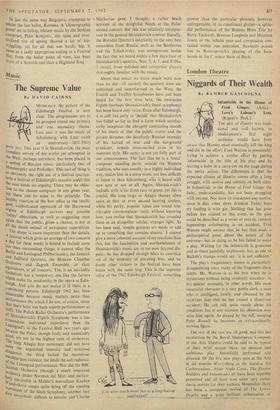Music
The Supreme Value
By DAVID CAIRNS
NIusicAux, the pattern of the Edinburgh Festival is now clear. The programmes are to be grouped round one primary and one secondary theme. Last year it was the music of Schoenberg, with Liszt (with an anniversary-1811-1961) Pros. ace. Thig year it Shostakovich; the most complete survey of his works yet attempted in the West, perhaps anywhere, has been placed in a setting of Russian music, particularly that of Moussorgsky and Prokofiev. This sort of thing is so obviously the right use of a festival (particu- larly a festival. of Edinburgh's massive scale) that the case needs no arguing. There may be objec- tion to the chosen composer in any given year, but there can be none to the principle. The healthy reaction of the box office to the sophisticated approach of the Harewood regirne at Edinburgh answers any possible Canny' objections, as well as suggesting once again that the public, given a chance, is not at all the dumb animal of newspaper superstition. The shape is more important than the details. A festival which gives an average of two concerts a day for three weeks is bound to include some less than outstanding things; it cannot offer the 4I'erlitt and Leningrad Philharmonics, the Janacek and Juilliard Quartets, the Moscow Chamber Orchestra and Zagreb Ensemble, or their Imitation, at all concerts. This is an inevitable Innitation, not a temporary one like the factors .Which make for mediocrity in the opera at Edin- burgh. And you do not notice it if there is a convincing pattern. Edinburgh 1962. has been memorable because music matters more than Performance (by.which I do not, of course, mean that there have not been superb performances as Well). The Polish Radio Orchestra's performance f Shostakovich's Eighth Symphony was a less tremendous individual experience than the Leningrad's in the Festival HaIl two years ago, ecause the Poles; though lively and undeniably good, are not in the highest rank of orchestras. _11.e long Adagio_ first movement did not have ne_ the anguished intensity and sustained ,:cluenee, the third-, lacked the monstrous achine-gun violence, the finale the soft radiance, "t the Leningrad performance. Nor did the BBC Scottish Orchestra (though a much improved ,warchestra under Norman del Mar, and particu- larly in Mahler's marvellous Knaben Movement songs) quite bring of the opening i 1.0vernent of the Sixth Symphony, another vast slow movement, difficult to sustain: and Charles Mackerras gave, I thought, a rather brash account of the delightful Ninth at the Poles' second concert. But this was relatively unimpor- tant in the general Shostakovich context. Equally, the Borodin Quartet's inferiority to the very best ensembles from Russia, such as the Beethoven and the Tchaikovsky, was unimportant beside the fact that we heard -Within a few days four of Shostakovich's quartets, Nos. 3, 4, 7, and 8 (No. 7 twice), from polished and competent players thoroughly familiar with the music.
About that music we know much more now than we did—till recently the quartets were un- published and unperformed in the West, the Fourth and Twelfth Symphonies have just been heard for the first time here, the enormous Eighth (perhaps Shostakovich's finest symphony) has been heard only twice. Even after Edinburgh, it is still too early to 'decide' that Shostakovich has failed so far to find a form which satisfac- torily integrates the abruptly contrasting moods of .his music or that the public orator and the private dreamer, the peculiarly Russian intensity of his hatred of war and the. fairgroundprankster, remain unreconciled even in his maturest style. His music is not yet fully part of our consciousness. The fact that he is a 'tonal' composer standing partly outside the Western tradition, who uses tonality in a highly individual way, makes him in a sense more, not less, difficult to listen to than Schoenberg, who is heard with new ears or not at all. Again, Shostakovich's melodic style is far from easy to grasp, yet this is crucial. His long largo or Adagio themes often seem at first or even second hearing. aimless, while his perky, popular tunes can sound irre- trievably commonplace—until; without knowing how, you realise that Shostakovich has revealed them in an altogether subtler, stranger light. As has been said, 'simple gestures are made to add up, to something that remains elusive.' I cannot give a more coherent account of my reactions than this, but the fascination and worthwhileness of Shostakovich's music are to me now beyond dis- pute : he has dropped enough hints to convince me of the necessity of pursuing him, and no doubt other visitors to the festival have been bitten with the same bug. This is the supreme value of the 1962 Edinburgh Festival, something 'you were inni Ii fun as ti long-haired
intellectual!'
greater than the particular pleasure, however unforgettable, of its constituent glories—a splen- did performance of the Brahms Horn Trio by Barry Tuckwell, Brenton Langbein and Maureen Jones, or the infinite pain and compassion con- tained within one unbroken, flawlessly poised line in Rostropovich's playing of the Sara- bande in the C minor Suite of Bach.


































 Previous page
Previous page